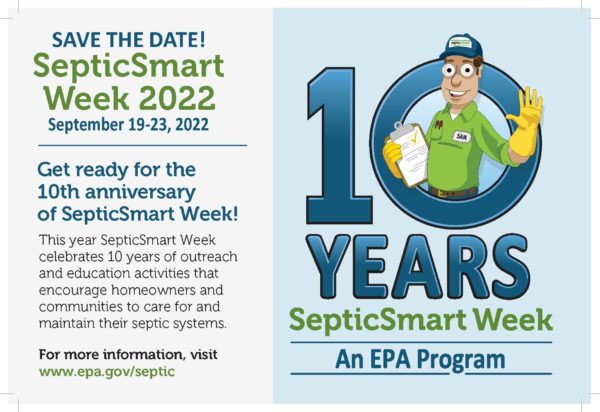SepticSmart Week 2022

Decentralized Wastewater Infrastructure: Challenges and Opportunities
Approximately 20% of U.S. homes are served by decentralized wastewater (onsite/septic) systems. Although these systems can provide an effective means to treat wastewater, for many homeowners the systems are substandard, malfunctioning, or non-compliant.
In many cases, inadequate and malfunctioning wastewater infrastructure disproportionately affect people of color and low-income communities – they often lack the financial resources to tackle these challenges and contend with potential health risks to families. Across the country, malfunctioning decentralized (onsite/septic) wastewater infrastructure is making the news. Recent articles from the Black Belt of Alabama, as well as Alaska, North Carolina, New Mexico and Massachusetts all point to the need for more funding to support building, repairing, or replacing aging or non-existent decentralized systems.
But it’s not all bad news. The arrival of the Bipartisan Infrastructure Law (BIL) provides an unprecedented opportunity to address wastewater infrastructure needs, particularly for underserved communities with decentralized infrastructure. The BIL provides $11.7 billion through the Clean Water State Revolving Fund (CWSRF) and sets aside 49% of that funding for grants or forgivable loans. This provides a pathway for communities to access traditional CWSRF loans to upgrade their wastewater infrastructure.
The decentralized wastewater industry is excited to have this moment! In our efforts to provide the country with safe and reliable wastewater treatment, we are also aware of the increasing need to provide support to those who need it most to repair, replace or access financing for a new decentralized system. In fact, there are 20 organizations that participate in a Memorandum of Understanding (MOU) with the U.S. Environmental Protection Agency (EPA) to collaborate on decentralized wastewater issues.
The EPA’s Decentralized Wastewater MOU Partnership prioritizes education and outreach to homeowners with decentralized systems. EPA’s SepticSmart program is an example of these efforts to share information with homeowners on the proper use, maintenance, and upkeep of decentralized systems. This year the Decentralized Wastewater MOU Partnership and EPA celebrate the 10th Anniversary of SepticSmart Week from September 19-23, 2022! In recognition of this anniversary, EPA is sponsoring a photo challenge to encourage interest in demonstrating the seven SepticSmart Quick Tips. We encourage you, your company, customers, or industry to take part by submitting photos or videos. Visit epa.gov/septic for additional information on the challenge.
The SepticSmart program also has an online outreach toolkit that provides useful information and videos on what to flush/not flush, the importance of inspecting your system, and pumping septic tanks as needed. These tools are intended to equip homeowners with the necessary basic information to keep their systems running effectively and efficiently.
The Decentralized Wastewater MOU Partnership has worked together since 2005 on priority issues, including mechanisms to fund or finance decentralized wastewater systems. EPA recently released a guide on how to use the CWSRF for financing decentralized projects. The MOU Partners are also focused on initiatives that problem-solve and find creative solutions to meet the nation’s decentralized wastewater financing needs (e.g. Decentralized Wastewater Innovation and Community Plumbing Challenge).
There is no doubt that much remains to be done to meet the needs of decentralized homeowners, particularly for those in underserved communities. Members of the MOU Partnership are working hard to ensure there are funding opportunities across the nation to meet these needs, brainstorming solutions to address malfunctioning systems, and working collaboratively to ensure all Americans have access to safe, reliable wastewater infrastructure, now and for future generations.
Signed,
Mary Clark, Technical Advisor, MDB, Inc. in collaboration with EPA Decentralized Wastewater MOU Partners
![2022 MOU Partners SSW Social Media Guide[52] 2022 MOU Partners SSW Social Media Guide52](jpg/2022-mou-partners-ssw-social-media-guide52-300x135.jpg)